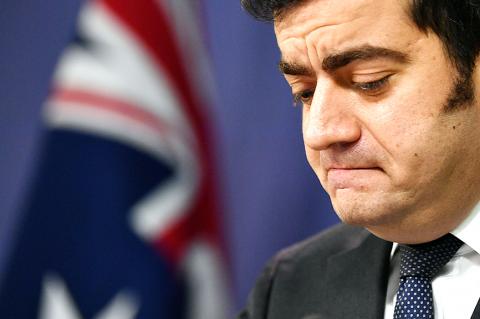Prominent Australian opposition Senator Sam Dastyari yesterday said he would resign from parliament after a series of allegations emerged about his links with Chinese-aligned interests in Australia.
Relations between Australia and China have become strained since Canberra announced last week it would ban foreign political donations as part of a crackdown aimed at preventing external influence in domestic politics.
In announcing the ban, Australian Prime Minister Malcolm Turnbull singled out China, citing “disturbing reports about Chinese influence.”

Photo: EPA
China hit back, with the People’s Daily describing media reports about Chinese interference as “racist” and “paranoid.”
Dastyari, widely viewed as a rising star of the center-left Labour opposition party, has been under fire since domestic media reported he had in 2015 sought to encourage the party’s deputy leader not to meet a Chinese pro-democracy advocate opposed to Beijing’s rule in Hong Kong.
“Today, after much reflection, I’ve decided that the best service I can render to the federal parliamentary Labour Party is to not return to the Senate in 2018,” Dastyari told reporters.
The latest allegations came after Turnbull on Monday told Australian Broadcasting Corp that Dastyari had warned Chinese political donor Huang Xiangmo (黃向墨) that his telephone might be tapped.
Dastyari had already quit some senior Labour positions after a tape surfaced of him appearing to endorse China’s contentious expansion in disputed areas of the South China Sea, against his party’s platform. The tape showed him standing next to Huang.
Turnbull accused Labor of “failing to put Australia first,” rhetoric that analysts said could widen divisions between Canberra and Beijing.
“The row has erupted and it has claimed a political scalp,” said Euan Graham, director of the international security program at the Lowy Institute, an Australian think tank. “China could retaliate through non-official sanctions such as reduced tourist numbers or through buying of goods elsewhere.”
China last year bought A$93 billion (US$70.5 billion) of Australian goods and services, easily making it the nation’s biggest trading partner.
However, growing trade ties are only one side of a delicate balancing act for Australia, whose unshakable security relationship with the US has limited how cozy it gets with China.

STILL COMMITTED: The US opposes any forced change to the ‘status quo’ in the Strait, but also does not seek conflict, US Secretary of State Marco Rubio said US President Donald Trump’s administration released US$5.3 billion in previously frozen foreign aid, including US$870 million in security exemptions for programs in Taiwan, a list of exemptions reviewed by Reuters showed. Trump ordered a 90-day pause on foreign aid shortly after taking office on Jan. 20, halting funding for everything from programs that fight starvation and deadly diseases to providing shelters for millions of displaced people across the globe. US Secretary of State Marco Rubio, who has said that all foreign assistance must align with Trump’s “America First” priorities, issued waivers late last month on military aid to Israel and Egypt, the

‘UNITED FRONT’ FRONTS: Barring contact with Huaqiao and Jinan universities is needed to stop China targeting Taiwanese students, the education minister said Taiwan has blacklisted two Chinese universities from conducting academic exchange programs in the nation after reports that the institutes are arms of Beijing’s United Front Work Department, Minister of Education Cheng Ying-yao (鄭英耀) said in an exclusive interview with the Chinese-language Liberty Times (the Taipei Times’ sister paper) published yesterday. China’s Huaqiao University in Xiamen and Quanzhou, as well as Jinan University in Guangzhou, which have 600 and 1,500 Taiwanese on their rolls respectively, are under direct control of the Chinese government’s political warfare branch, Cheng said, citing reports by national security officials. A comprehensive ban on Taiwanese institutions collaborating or

France’s nuclear-powered aircraft carrier and accompanying warships were in the Philippines yesterday after holding combat drills with Philippine forces in the disputed South China Sea in a show of firepower that would likely antagonize China. The Charles de Gaulle on Friday docked at Subic Bay, a former US naval base northwest of Manila, for a break after more than two months of deployment in the Indo-Pacific region. The French carrier engaged with security allies for contingency readiness and to promote regional security, including with Philippine forces, navy ships and fighter jets. They held anti-submarine warfare drills and aerial combat training on Friday in

COMBAT READINESS: The military is reviewing weaponry, personnel resources, and mobilization and recovery forces to adjust defense strategies, the defense minister said The military has released a photograph of Minister of National Defense Wellington Koo (顧立雄) appearing to sit beside a US general during the annual Han Kuang military exercises on Friday last week in a historic first. In the photo, Koo, who was presiding over the drills with high-level officers, appears to be sitting next to US Marine Corps Major General Jay Bargeron, the director of strategic planning and policy of the US Indo-Pacific Command, although only Bargeron’s name tag is visible in the seat as “J5 Maj General.” It is the first time the military has released a photo of an active